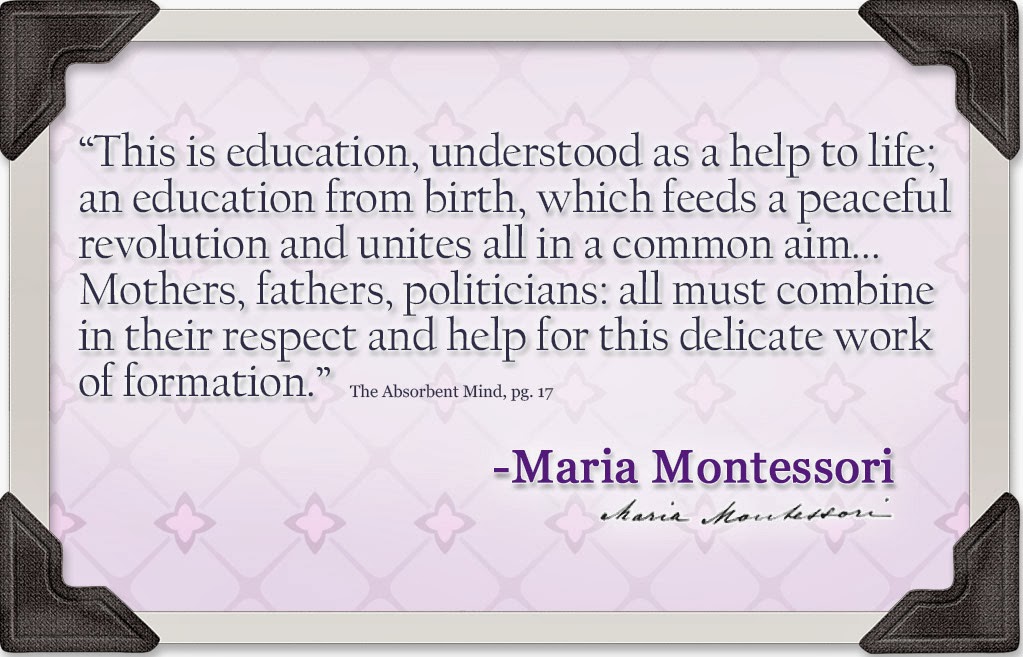
“In states that make it a priority to educate our youngest children…studies show students grow up more likely to read and do math at grade level, graduate high school, hold a job, form more stable families of their own. We know this works. So let’s do what works and make sure none of our children start the race of life already behind.” ~ President Barack Obama, State of the Union, February 12, 2013.
This is the second installment of our series, Studying the Works of Montessori, focusing on Chapter 2 of the Absorbent Mind.
Studying the Works of Montessori - The Absorbent Mind, Chapter 2: Education for Life
Last week, I heard an interesting newscast in which the Governor of Idaho, Butch Otter, announced that his highest priority for 2014 and beyond is investing in the state’s “K through Career” education program. Idaho currently ranks 50 out of 50 states in terms of the amount of money it spends per student. Statistics claim that 80% of Idaho’s public high-school students graduated in 2010, but only one-tenth percent of those graduates continue on to college. So while Idaho ranks 13th in the nation for the number of high-school graduates, they rank 45th in the number of people who continue on to higher education. (Wooten, 2014) Governor Otter’s stand is that education does not end once you get your high school or even college diploma. And with the projection for Millennials (people born in the 1980s and 1990s) holding an average of 15–20 jobs during their lifetime (Meister, 2012), it is clear that education must continue well into one’s career.
To those of us familiar with the writings of Maria Montessori, this should come as no surprise. In Chapter 2 of the Absorbent Mind, Dr. Montessori writes, “This is education, understood as a help to life.” (Montessori, 1964) But where does this education for life begin? Montessori argues that it must start at birth. In fact, she argues, this is the most critical time to educate children as it is the time when the intellect and personality are formed. She contends that it is not university that is of utmost importance, but schooling for children from birth to six years old. While we cannot teach the youngest of these children using traditional methods, we can carefully observe them and learn exactly what each one needs.
Montessori, in her wisdom, calls upon society and the state to provide the authority and the means for educating children. Yet she cautioned that if “education is to be regarded as a help to life, then this control will never be restrictive and oppressive, but it must take the form of physical and psychic help.” (Montessori, 1964)

“This is education, understood as a help to life; an education from birth, which feeds a peaceful revolution and unites all in a common aim, attracting them as to a single center.” (Montessori, 1964)
Education for life…a lofty idea. And one that has not been fully manifested in compartmentalized traditional education. It seems that we focus so much on the outcome and culmination of twelve years of education that we have neglected to look at education from the beginning. If we educate our youngest children and explore their full potential, we will not have to worry about them continuing their education. If we plant the seeds of imagination, curiosity, and discovery when they are young, we will be able to cultivate their knowledge when they are older.
Works Cited
Meister, Jeanne. “Job hopping is the ‘new normal’ for Millennials: three ways to prevent a human resource nightmare.” Forbes.com, August 14, 2012. http://www.forbes.com/sites/jeannemeister/2012/08/14/job-hopping-is-the-new-normal-for-millennials-three-ways-to-prevent-a-human-resource-nightmare/
Montessori, Maria. The Absorbent Mind. Wheaton, IL: Theosophical Press, 1964.
Obama, Barack. Address. State of the Union. Washington, DC, February 12, 2013. Retrieved from http://www.whitehouse.gov/the-press-office/2013/02/12/remarks-president-state-union-address
Wooten, Julie. “Most Idaho students finish high school, skip college, report says.” Magicvalley.com, January 10, 2014. http://magicvalley.com/news/local/most-idaho-students-finish-high-school-skip-college-report-says/article_89c80feb-0f39-5915-a834-ddb05012d8b2.html
As much as possible, NAMC’s web blog reflects the Montessori curriculum as provided in its teacher training programs. We realize and respect that Montessori schools are unique and may vary their schedules and offerings in accordance with the needs of their individual communities. We hope that our readers will find our articles useful and inspiring as a contribution to the global Montessori community.
© North American Montessori Center - originally posted in its entirety at Montessori Teacher Training on Tuesday, February 4, 2014.
© North American Montessori Center - originally posted in its entirety at Montessori Teacher Training on Tuesday, February 4, 2014.

0 comments:
Post a Comment
Have questions or comments? Let us know what you thought about this article!
We appreciate feedback and love to discuss with our readers further.